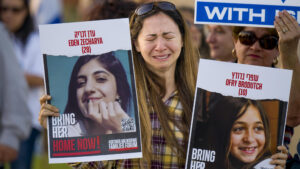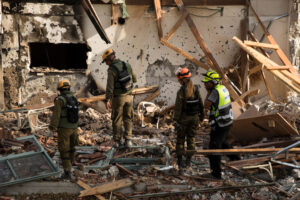Lily Moo is used to death threats: in the past 14 months, 19 against her have been reported to the police. An Iranian in London, she has been leading Woman, Life, Freedom marches in her adopted home — calling for a feminist revolution in the Islamic republic — for more than a year. But right now, she is in hiding. After her defiant speech at the pro-Israel vigil earlier this month went viral, a man came up to her in the street and told her that, now she was speaking up for Jewish people, killing her would be justified within Islam. “He said my blood was halal which means they believe they have divine permission to take my life,” she tell me. “My sin is Zionism.”
Lily Moo is a pseudonym; she is too worried to use her real name. When she leaves the house, she wears a disguise. The police have been advising her about how to stay safe. Most recently, she attended a joint Jewish and Iranian event for peace. Since then, she has been “in a kind of prison”.
“It is really horrible to be in London and having to hide from extremist Islamic groups,” she says. “It feels like it was in the days before my family left Iran, when women couldn’t leave the house. I knew the Iranian secret services were already keeping an eye on me — making the odd threat.” But now, other Islamic groups seem to be watching her, which “makes it twice as scary”.
Lily Moo is not the only Iranian who is in danger for speaking up for Israel. In Iran itself, supporters of Israel communicate using secret social-media accounts because they know others have been “vanished” for doing the same. Closer to home, another dissident, Vahid Beheshti, has been protesting outside the Foreign Office for 10 months, in an effort to get the British government to prescribe the Iranian Islamic Revolutionary Guard Corps (IRGC) as a terrorist organisation. Recently, he started flying an Israeli flag alongside his Persian one. One Saturday, as a pro-Palestinian demonstration marched past, someone took his Israeli flag — and as he gave chase he was warned he would be beheaded. The man who is alleged to have made the threat was later arrested by police and found to have a knife on him.
The danger is very real. Last year, MI5 foiled at least 10 potential IRGC plots to kidnap or kill people in Britain. In February, the dissident Persian language satellite station Iran International moved from London to Washington because of threats to its staff.
Both Lily and Vahid are understandably frightened, but determined to keep speaking out at pro-Israel events. “It is a duty,” says Lily Moo, whose family left Iran when she was 13, as the growing power of the “morality police” became suffocating. “The danger people are facing from Iran and its proxies… is not just about Iranian people, it is not just about Israel: it is about all of us.”
“They want to kill everyone who is a non-believer,” adds Vahid, who escaped Iran 24 years ago. “They believe they will go to heaven for doing it. That is their mentality.” He is dedicated to raising awareness of the brutality of the IRGC and its proxies, which include Hamas and Hezbollah. Citing how Iran and Hezbollah are accused of the 1994 bombing of a Jewish Centre in Argentina that killed 85 people, he says the brutality of the events of October 7 did not surprise him. “In Iran girls and boys are raped too, people are kidnapped or go ‘missing’ all the time. Torture is one of their tools; they cut off the fingers of people. In the past year alone more than 80 children under the age of 17 have been shot dead.”
Last September, a young Kurdish Iranian woman, Jina Mahsa Amini, was murdered by police for not wearing her hijab correctly. It sparked a wave of Woman, Love, Freedom protests. Since they began, hundreds if not thousands have been shot or arrested. A year ago, Iranian human rights organisation HRANA documented 520 people who had been killed in the first 82 days of the demonstrations — Vahid says he believes the number is now closer to 2,000 people. He adds: “While they say they have arrested 20,000, the true number is closer to 70-80,000.” Even after they are released, Vahid says, some prisoners commit suicide, having experienced such severe torture.
The alliance between Iranian dissidents and Israel is partly a case of my enemy’s enemy is my friend. Iran’s Supreme Leader Ayatollah Ali Khamenei has Israel-hate at the centre of his world view. His regime funds Hamas as well as Hezbollah, which is threatening war on the Lebanese front, and the Houthis, who have been firing missiles at Israel from Yemen in recent weeks. Iranians are taught to chant “death to Israel” while still at school.
It makes sense that Iranians who object to the Ayatollah’s increasingly vicious crackdown on free speech would stand with the people he hates most. But there is so much more to it than that. Jews and Iranians have ties going back centuries, to before the birth of either Mohammed or Jesus. The Persian King known as Cyrus the Great is celebrated for freeing his kingdom’s Jewish slaves and returning them to Jerusalem in 539BCE — but many Jews stayed in the area.
In 1948, the year that Israel was established, there were 150,000 Jews living in Iran. It was one of the few countries in the Middle East not to throw out all its Jews. But as tensions between Islamicists and the more tolerant Shah loyalists grew throughout the Seventies, Jews started to leave. Then came the 1979 revolution, in which Ayatollah Khomeini took over, triggering a mass exodus of Jews. Today, there are just 10,000 in the country.
The longing Persian Jews retain for their former home is depicted brilliantly in the recent Israeli-American television show Tehran, starring the Iranian-Israeli actress and singer Liraz Charhi. Her family fled Iran in the Seventies, after being forced to read the Koran. But long before October 7, Liraz discovered that she can speak to people in the country she has never been allowed to visit. (Iran, like many other Middle Eastern countries, bans people with Israeli passports.) After falling in love with Persian music, she decided to write her first album in Farsi. “Many people thought I was mad,” she tells me. But after its release in 2018, it became a huge hit in Iran. “An Iranian DJ started to play my music and people would send me videos of them taking their veils off and dancing.” Her most recent album was secretly made in Turkey with Iranian musicians who had to remain nameless for their safety.
When Hamas invaded Israel on October 7, and five members of Liraz’s husband’s family were killed at Kibbutz Be’eri, she was inundated with messages from new Iranian friends. “Last year we suffocated from this madness when Jina Amini and the others were murdered in cold blood in our homeland,” reads one. Another says: “99% of Iranians are supporting Israel and all of your people in this difficult moment. We stand with you.” Footage has come out of Iran showing students deliberately avoiding walking over Israeli and American flags painted outside their university. Shortly after Hamas’s massacre, a few Iranians brandishing Palestinian flags at a game in Tehran were met with overwhelming resistance from a large crowd of other fans.
In the West, we tend to view the war over Gaza as part of a conflict that started in 1948; in the Middle East, people understand that the roots go much deeper and spread much wider. So, the Iranians who support Israel are not only calling for revolution in their own nation; they are supporting an ally against an evil that threatens the entire world.
“The people of Israel and Iran share the same enemies and we have no choice but to fight together,” says Vahid. But “this isn’t just about us in the Middle East but an ideology that everyone in the West needs to fight.” It is a battle against a fundamentalist ideology, and for freedom and democracy. “We need Israel to win, to beat Hamas,” says Vahid, “because the arms of the Iranian octopus need to be chopped off.”
Disclaimer
Some of the posts we share are controversial and we do not necessarily agree with them in the whole extend. Sometimes we agree with the content or part of it but we do not agree with the narration or language. Nevertheless we find them somehow interesting, valuable and/or informative or we share them, because we strongly believe in freedom of speech, free press and journalism. We strongly encourage you to have a critical approach to all the content, do your own research and analysis to build your own opinion.
We would be glad to have your feedback.
Source: UnHerd Read the original article here: https://unherd.com/



